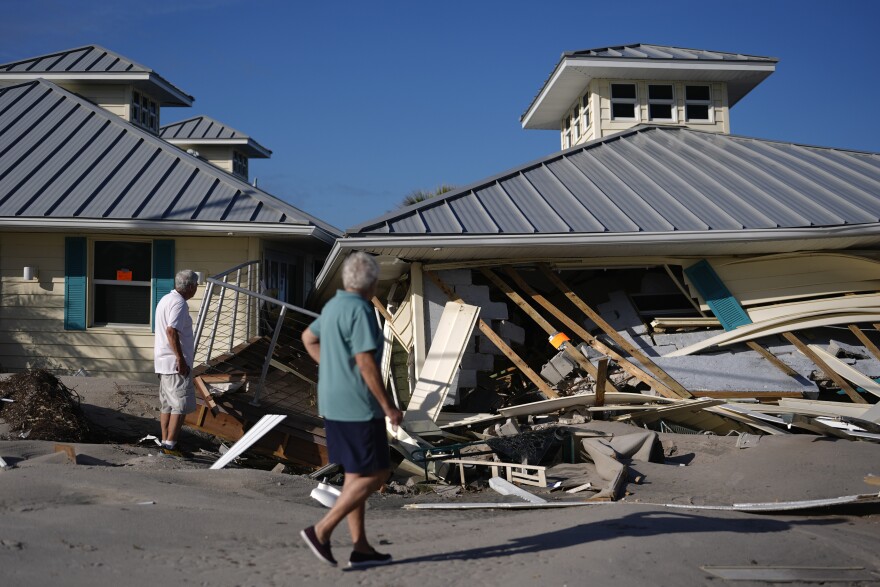State legislators are discussing the possibility of revising a new law that has drawn legal challenges because it blocks cities and counties from approving "more restrictive or burdensome" changes to growth plans.
Senate Majority Leader Jim Boyd, R-Bradenton, said Monday during a Manatee County legislative delegation meeting that he has talked with sponsors of the 2025 legislation and that “tweaks” are being discussed.
“I know I could speak for them because I talked to them individually,” Boyd, who is slated to become Senate president after the 2026 elections, said during the delegation meeting in Bradenton. “We said all along, if there's things we can tweak and we need to fix, we certainly will.”
ALSO READ: Florida's new growth law draws another legal challenge
Sen. Tom Leek, R-Ormond Beach, made similar comments Monday during a St. Johns County delegation meeting in St. Augustine.
“I can't tell you what those changes are going to look like, finally, because, like I said, it's a collaborative process negotiated between the two chambers (the House and Senate),” Leek said. “But there will be some changes to that bill, I fully expect. At least that's what I'm pushing for.”
The limit on changes to growth plans was included in a wide ranging bill (SB 180) that Gov. Ron DeSantis signed on June 26. Numerous cities and counties and the growth-management group 1000 Friends of Florida have filed two lawsuits in Leon County circuit court challenging the constitutionality of the part of the law dealing with growth plans.
The city of Ocoee has also filed a case at the state Division of Administrative Hearings after the Florida Department of Commerce rejected the city’s revised comprehensive plan because of the law.
During delegation meetings across the state in advance of the 2026 legislative session, residents and local officials have criticized the part of the law that has essentially frozen local land-development regulations and comprehensive plans through Oct. 1, 2027. That part of the law also was made retroactive to Aug. 1, 2024.
“Right now, in Manatee County, our board of county commissioners cannot do what we the people elected them to do. Why? Because of the vague language contained in SB 180. It’s an easy fix,” Kevin Wright, representing the Manatee County Republican Liberty Caucus, told the Manatee County delegation.
The overall bill included a series of measures aimed at helping the state recover from three hurricanes that made landfall in 2025. For example, it required local governments each year to set in advance at least one debris-management site; to develop plans for businesses and homeowners about post-storm permitting processes; to establish what are known as mutual-aid agreements to bring in help from elsewhere; and to set plans for staffing after storms. Local governments also will be prohibited from increasing building-permit and inspection fees for 180 days after emergencies are declared for hurricanes or tropical storms.
DeSantis has defended signing the bill, saying the “the core issue” for him was to ensure people whose homes were damaged by hurricanes could rebuild without government interference.
ALSO READ: 25 cities and counties, including Manatee, are suing the state over a new growth law
“If you have damage to your home and you go to rebuild it and to restore it to what it looked like the day before that storm hit, you should be permitted to do it,” DeSantis said Sept. 3 during an appearance in Valrico. “The government cannot prevent you from doing that. And these local governments were not allowing that. They were being difficult. So we got a lot of complaints about that.”
Manatee County Commission Chairman George Kruse, whose county is part of one of the lawsuits filed in Leon County, expressed support for amending the law.
“We do not want to see Senate Bill 180 go away. It's a great bill,” Kruse told lawmakers Monday. “We just want it tweaked so that the intent is actually implemented by the agencies. We have three branches of government, and your branch of government, I believe, passed a good, albeit unclear bill. We just need to make sure it's clarified so that other branches of the government are acting upon it to allow municipalities to have the home rule necessary for proper growth management.”
The disputed part of the law applies to governments that were placed under federal disaster declarations from any of the three 2025 hurricanes. All 67 of Florida’s counties were listed in at least one of the three declarations.
Sen. Don Gaetz, R-Niceville, and Rep. Shane Abbott, R-DeFuniak Springs, have filed identical bills (SB 218 and HB 217) for the 2026 session that would carve out certain counties from the freeze on changing growth plans.
“This (new) bill ensures that counties not affected by Hurricanes Debby, Helene, and Milton regain full local control overgrowth and development decisions,” Abbott posted last week on Facebook. “It protects communities that were not impacted by Hurricanes Debby, Helene, or Milton from unnecessary restrictions so they can keep moving forward.”
The proposal would exempt from SB 180 most of the Panhandle west of Tallahassee, excluding the coastal Gulf and Franklin counties; Nassau County in the northeast corner of the state; and Monroe and Miami-Dade counties in South Florida.
The 2026 session will begin Jan. 13.



